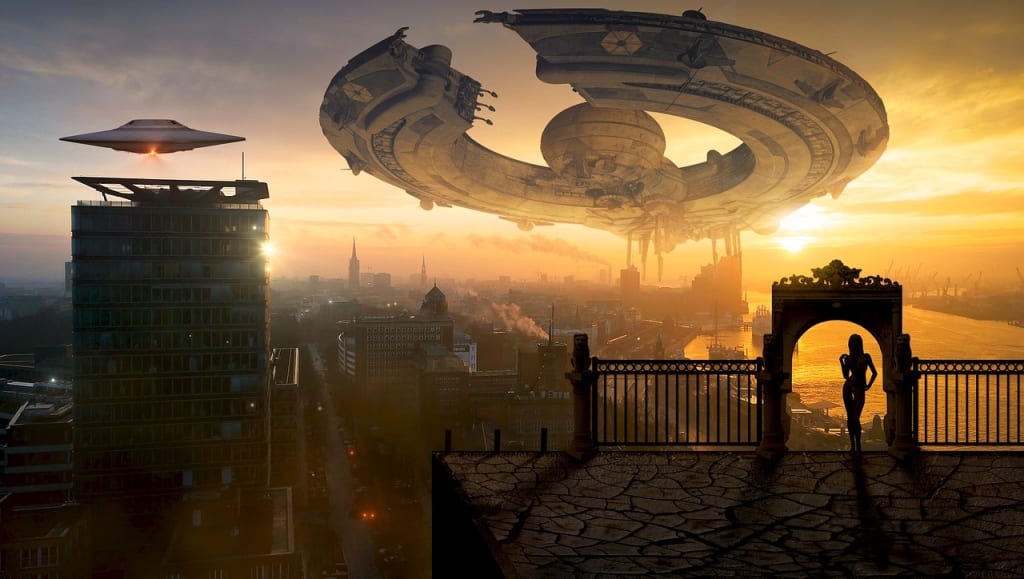From Fiction to Reality: How Science Fiction Predictions are Shaping the Future
Exploring the Impact of Sci-Fi Imagination on Science and Technology

Introduction
Science fiction has long captivated the human imagination, transporting us to worlds beyond our own and introducing concepts that were once considered mere figments of imagination. However, what was once seen as pure fantasy is now becoming a reality, thanks to the remarkable advancements in science and technology. In this blog, we will delve into the fascinating realm where fiction meets reality, exploring how science fiction predictions are shaping the future and revolutionizing our world
The Influence of Science Fiction
Science fiction has proven to be a powerful force in shaping the direction of scientific research and technological innovation. Visionary authors like Jules Verne, H.G. Wells, and Isaac Asimov have inspired generations of scientists and engineers, who have turned their imaginative ideas into tangible breakthroughs. From space travel to artificial intelligence, the influence of science fiction can be seen in every aspect of modern life.
Space Travel: The Final Frontier
One of the most iconic science fiction themes is space travel. Through the works of authors like Arthur C. Clarke and movies like "2001: A Space Odyssey," humanity's curiosity and desire to explore the cosmos were kindled. Today, we are witnessing the fruition of those dreams with the development of commercial space travel companies like SpaceX and Blue Origin, bringing us closer to the reality of interplanetary colonization.
Artificial Intelligence: A Journey into Sentience
The concept of artificial intelligence (AI) has been a staple in science fiction, often depicted as intelligent machines capable of human-like thought. While we may not have achieved full-blown sentient AI just yet, significant progress has been made. Technologies like machine learning and neural networks have paved the way for advancements in natural language processing, computer vision, and autonomous systems. From virtual assistants like Siri and Alexa to self-driving cars, AI is revolutionizing industries and transforming our daily lives.
Robotics: From Fictional Characters to Real-World Companions
Robots have been a recurring theme in science fiction, portrayed as helpful companions, powerful adversaries, or even empathetic beings. As technology progresses, we are witnessing the emergence of sophisticated robots that can assist with tasks, provide care for the elderly, and perform complex surgeries. Humanoid robots like Boston Dynamics' Atlas and Softbank's Pepper are blurring the line between fiction and reality, paving the way for a future where robots are integrated into society.
Biotechnology and Genetic Engineering
Science fiction has often explored the possibilities and consequences of biotechnology and genetic engineering. From the creation of genetically enhanced beings to the eradication of diseases, these ideas are becoming more tangible. CRISPR-Cas9, a revolutionary gene-editing tool, holds the potential to alter our DNA and cure genetic disorders. However, ethical concerns and regulatory frameworks must be carefully considered as we navigate the ethical landscape of manipulating life itself.
Futuristic Cities: Designing the Urban Landscape
Science fiction has depicted futuristic cities with towering skyscrapers, flying cars, and advanced transportation systems. As urban populations continue to grow, the need for sustainable and efficient cities becomes more pressing. Concepts like smart cities, green architecture, and renewable energy are inspired by science fiction's vision of a harmonious coexistence between technology and the urban environment.
Communication and Information Technology
Science fiction has predicted the development of instantaneous communication, virtual reality, and augmented reality. Today, these technologies are transforming the way we connect and interact with each other. With the advent of 5G networks, virtual reality headsets, and augmented reality applications, we are witnessing a convergence of science fiction and reality, enabling immersive experiences and blurring the boundaries between the physical and digital worlds.
Ethical and Societal Implications
As science fiction predictions become reality, we must grapple with the ethical and societal implications of these advancements. Issues such as privacy, inequality, job displacement, and the responsible use of technology need to be addressed to ensure a future that benefits all of humanity. By learning from the cautionary tales portrayed in science fiction, we can navigate these challenges and shape a future that is inclusive, equitable, and sustainable.
Conclusion
Science fiction has always been a source of inspiration and fascination, igniting the human imagination with possibilities beyond our current understanding. As science and technology continue to advance, we are witnessing the transformation of these imaginative concepts into real-world innovations. By embracing the visionary ideas of science fiction and addressing the challenges they present, we have the opportunity to shape a future that surpasses even our wildest dreams. Let us embrace the journey from fiction to reality and pave the way for a brighter and more extraordinary future.






Comments
There are no comments for this story
Be the first to respond and start the conversation.